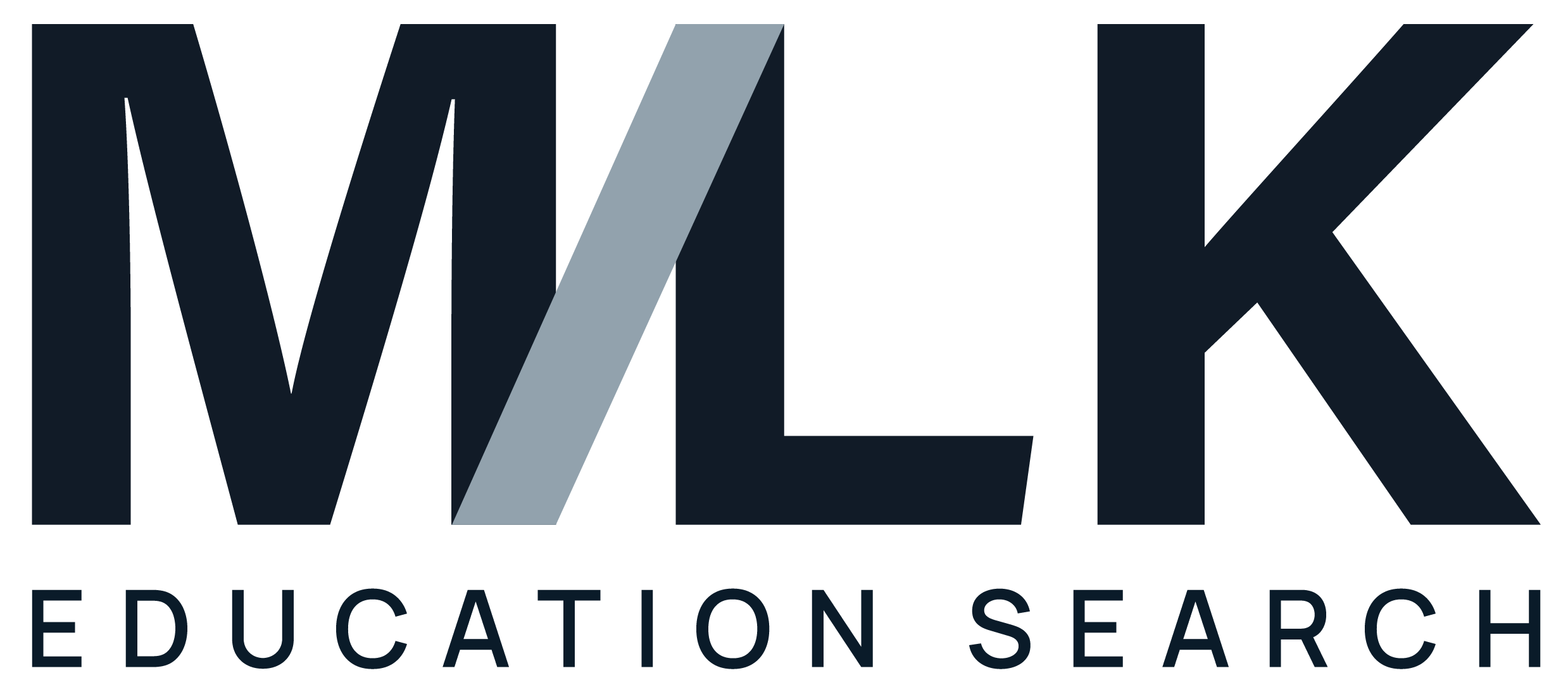According to the National Literacy Trust, 77% of 13- to 18-year-olds had used generative Artificial Intelligence (AI) in 2024. That’s a 40% increase from 2023. Is AI in schools going to become the norm?
The research also found that 48% of teachers used generative AI in their roles, increasing from 31% in 2023.
AI isn’t going anywhere and is rapidly developing. So, should educators embrace or reject this new change in the classroom?
Educators who have been in the profession for many years will have seen incredible changes in technology, and it can be hard to keep up with just how quickly AI has advanced.
But the speed at which AI seems to have appeared in everyday life doesn’t necessarily mean it’s completely at odds with inclusive and high-quality teaching and learning.
Let’s take a look at key questions educators have about AI…
- How can AI support students?
- How can AI benefit teachers?
- Potential barriers and concerns
- How MLK Education Search can support your school
How can AI support students?
AI in schools, when used effectively, can be a positive tool. The speed at which AI produces results means learning can happen quickly and efficiently, depending on the topic. Although it may seem like AI doesn’t require as much critical thinking as more traditional methods of learning, it does have its benefits.
Personalised Learning
Students can use AI for personalised learning, which means they can receive a learning plan tailored just for them. AI can make learning more adaptive, meaning students won’t have to repeat concepts they already know and can instead receive learning that focuses on gaps in their knowledge.
This kind of personalised support can be particularly useful for homework tasks, revision, or tasks that students need to complete independently.
Improved Accessibility
AI helps to improve accessibility through things like automatic speech recognition, chatbots, and visual aids. This can support students with SEND or students who may need to complete their studies at home. AI removes barriers to learning in this way and can be used as a way to effectively differentiate learning for all students.
Tutoring
There is an array of chatbots and AI tutors available to support students both inside and outside the classroom. These can be really useful as homework tasks, and can guide students to the answers, rather than directly providing them like most generative AI platforms.
However, these platforms can come at a cost for teachers, so if you are considering using AI tutors in the classroom, it’s important to do some research beforehand.
How can AI benefit teachers?
Although AI can potentially reduce teacher workload, many schools are yet to implement AI technologies at all. Some educators are sceptical about the impact AI will actually have on their workload or student outcomes.
With the Department for Education currently developing AI tools to help tackle teacher workload, can AI actually save you time as an educator?
Lesson Planning
One of the most time-consuming tasks for teachers is creating interesting and engaging lesson plans. Whilst a lot of schools provide shared lessons or schemes of work, teachers still need to spend time adapting those lessons for their students.
Using effective prompts, AI can create activities and even full lesson plans. This means more time can be spent on preparing resources, CPD, and actual teaching.
Marking and Assessments
Alongside lesson planning, marking is also notorious for taking up teachers’ time after hours. It can be a point of stress for many educators, especially if they have large classes.
Whilst there are approaches teachers can use in the classroom to reduce marking workloads, such as live marking, AI can greatly assist with marking, and there are many tools now available for schools to consider.
Some tools require teachers to upload the work which will then be checked by AI, while others can be used by students to check their answers independently.
Classroom Management
Whilst generative AI platforms can provide suggestions for classroom management, this isn’t a replacement for knowing your students and how they work best.
However, some classroom management systems, such as ClassDojo, have now incorporated AI into their platforms. These tools can create personalised comments for students’ behaviour reports and help teachers to communicate with each other about pupil progress.
Potential barriers and concerns
AI platforms are powerful tools that can have a huge impact on teacher workload and student support, if used effectively.
However, educators evidently have some concerns about students using AI on a regular basis.
Cheating
With many students gaining confidence using AI and chatbots, such as ChatGPT, it can be difficult to monitor their usage when it comes to school work. New platforms are emerging that claim to generate “undetectable AI content” and “plagiarism free essays”, which is likely to attract a lot of students.
What are the suggestions for educators to tackle this?
- Verbal assignments. Asking students to recall information and share ideas verbally as opposed to through written essays is one way to assess their understanding without the potential for plagiarism.
- Direct supervision. Instead of setting homework, teachers may instead ask pupils to complete tasks or coursework under direct supervision in class. This prevents anyone from using AI.
- Education about the dangers of AI. A reliance on AI can limit students’ understanding of topics and may greatly hinder them later down the line when it comes to exams or applying for jobs. Making students aware of this can encourage them to use their own critical thinking skills in preparation for times when AI won’t be available.
The Ethics of AI
Generative AI can be used to create all kinds of content, including images and videos.
With many students using social media in their free time, access to AI like this can encourage a dangerous form of cyberbullying, through AI-generated media. This can lead to students creating fake content which can have devastating consequences.
Making young people aware of these new online dangers is essential to their safety, and in partnership with Make Life Kind Charity, we’re here to support you to tackle this.
Make Life Kind work with inspiring school speakers to equip students with the tools to handle tough topics, such as mental health, bullying, online safety, and more. Their online safety speakers provide interactive workshops and talks, focusing on issues such as online bullying, social media comparison and the dangers of AI.
Get in touch with Make Life Kind today to book an online safety session for your students!
No matter your stance on AI, MLK is here to help
In a recent LinkedIn poll, the majority of voters believed that educators and students are benefiting from AI in schools. Is your school embracing AI fully, or do you still have your reservations?
At MLK Education Search, we can help you to manage students’ use of AI with our range of CPD courses, including:
- Staying Safe Online Certification
- Safeguarding Children on the Internet Certification
- What Can You Trust Certificate
- And more at Milk Academy!
Make Life Kind’s engaging workshops and talks also provide support for online safety and online bullying, hosted by passionate, relatable speakers who have real-life experience. Each session equips students with the tools to navigate the challenges of the online world and encourages them to make positive choices.
More than just a recruitment company, MLK Education Search provides a long-term partnership to deliver a permanent solution to staffing, all with wellbeing and values in mind, dedicated to adding value where ever we can.
Contact us to learn more about how we can support your school’s long-term plan with our expert guidance and exclusive access to high-quality staff.




